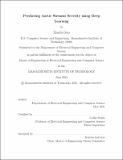| dc.contributor.advisor | Stultz, Collin | |
| dc.contributor.author | Guo, Xiaolu | |
| dc.date.accessioned | 2022-01-14T14:53:05Z | |
| dc.date.available | 2022-01-14T14:53:05Z | |
| dc.date.issued | 2021-06 | |
| dc.date.submitted | 2021-06-17T20:13:16.397Z | |
| dc.identifier.uri | https://hdl.handle.net/1721.1/139153 | |
| dc.description.abstract | Recent years have seen the rise of AI-based solutions to understanding, predicting, and treating heart disease, the leading cause of death globally. This thesis focuses on aortic stenosis, one of the most common and severe valve diseases. The evaluation of patients with suspected aortic stenosis includes echocardiography - an ultrasound based procedure that is used to visualize and evaluate the aortic valve. Interpretation of echocardiographic images currently requires expert evaluation by a cardiologist trained in the analysis of cardiac ultrasound. Our hypothesis is that deep learning can be used to learn structures within echocardiographic images, yielding sophisticated tools that can improve our ability to prognosticate patients with aortic stenosis. Our goal is to develop video-based deep learning models that predict the severity of aortic stenosis, which is numerically defined by the mean gradient and the valve area, in a given patient. The results from this thesis will pave the way for understanding more about aortic stenosis and providing better clinical care for patients with this disorder. | |
| dc.publisher | Massachusetts Institute of Technology | |
| dc.rights | In Copyright - Educational Use Permitted | |
| dc.rights | Copyright MIT | |
| dc.rights.uri | http://rightsstatements.org/page/InC-EDU/1.0/ | |
| dc.title | Predicting Aortic Stenosis Severity using Deep Learning | |
| dc.type | Thesis | |
| dc.description.degree | M.Eng. | |
| dc.contributor.department | Massachusetts Institute of Technology. Department of Electrical Engineering and Computer Science | |
| mit.thesis.degree | Master | |
| thesis.degree.name | Master of Engineering in Electrical Engineering and Computer Science | |
